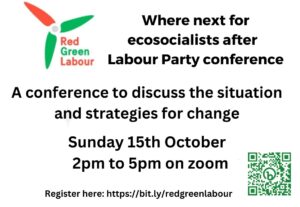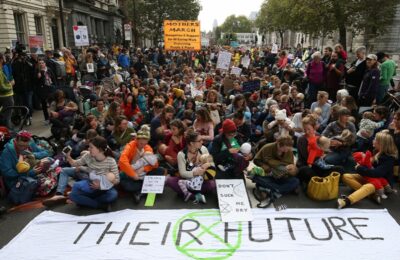
Where next for ecosocialists after the Labour Party conference? – A discussion paper
The election of Jeremy Corbyn to the leadership of the Labour party in 2015 sparked hope among ecosocialists and many in the wider environmental movement that an opportunity had opened up for real progress in moving towards a socially and economically just zero carbon future – and that that future lay with the Labour Party.
The huge wave of support for Labour for a Green New Deal within the party and the inclusion of most of its key proposals in the 2019 manifesto seemed to prove that Labour was firmly committed to a radical and transformational programme to combat climate change. Even when Keir Starmer won the Leadership election in 2020, he did so on the basis of a series of pledges that included a promise that he would “put the Green New Deal at the heart of everything we do. There is no issue more important to our future than the climate emergency.”
By 2021, although Starmer had reneged on (among other pledges) his support for the public ownership of rail, mail, energy and water, at that year’s Annual Conference he set out measures including an annual £28bn green investment fund, a mass retrofitting programme, a pledge to decarbonise steel and a “net zero and nature test” for every policy – plans which echoed many of the initiatives for a green industrial revolution that were set out in detail at the 2019 manifesto. Indeed, the commitment to a 10-year £280 billion investment in renewable energy was both larger and more focused than the 2019 manifesto which committed to a £250 billion investment without a specific time scale.
However, while Starmer announced that Labour’s Climate Investment Pledge “will transform our economy and follow the example set by the Labour Government in Wales by investing £28 billion of capital into the green economy for each and every year over this decade” and Rachel Reeves boasted that she will be Britain’s ‘first green chancellor’, back in January this year we in Red Green Labour warned that they were both in thrall to the economic orthodoxy of those terrible twins, the Treasury and the Bank of England. We pointed out that Starmer had already used the country’s dire economic state as an excuse for reneging on his commitments to public ownership and his insistence on rigid ‘fiscal discipline’ meant that there was a real danger that Labour’s commitment to £28bn a year to fuel a green industrial revolution could be, regretfully no doubt, delayed, watered down and/or disappear behind a smoke screen of waffle and double counting. It happened sooner than we expected.
This isn’t just another example of a politician’s duplicity, cowardice or electoral opportunism (although it is an example of all three), it is part of a considered strategy to decisively move Labour towards being the go-to party of the establishment, a safe pair of hands which can be relied upon by capital to steer the ship of state on a reliable and unchallenging course. Starmer and the Stalinist apparatchiks to whom he has outsourced the policing of the party’s
membership have clearly decided that the left must never again have the opportunity to challenge the hegemony of the right, or indeed to question it, through the establishment of an unprecedented regime of authoritarian control freakery designed to intimidate, demoralise and preferably exclude any organised opposition or even individual dissenters. The hopes that many tens of thousands had in the heady early days of Corbyn’s leadership that the Labour Party might become the vanguard of a new mass movement for social and environmental justice has become, in the words of Joni Mitchell “just a dream some of us had.”
Although continuing to organise on the basis of hoping that somehow, someday, it will be possible to catch Labour’s establishment off guard again and repeat the Corbyn insurgency that so nearly succeeded is futile and self-deluding, the Labour Party remains, for the moment, an important arena of activity for ecosocialists. While Labour has lost almost a quarter of a million members, most of whom have left in despair of the total duplicity of the Starmer leadership and the ruthless counter-coup of the party’s bureaucrats, there exists within the party a significant, if residual, core of thousands of socialists and left social democrats who are and should be part of the audience that ecosocialists are aiming at. In particular, working among active trade unionists, many of whom still have a relationship (albeit increasingly shaky) with Labour is central to building a mass movement for climate justice.
However, other forces are in the field. The ‘environmental movement’ has until the last four or five years been identified with large (and increasingly corporate) organisations like Greenpeace, Friends of the Earth and, in an electoral context, the Green Party. More recently the more radical Extinction Rebellion and its various offshoots and franchises have had some real successes in mobilising large numbers to undertake direct action. In addition, the COP26 Coalition had some success in mobilising groups and the labour movement around the COP processes Glasgow and continues, in the shape of the Climate Justice Coalition, to work to build a broad based alliance of trade unions, grassroots community groups and NGOs aiming at climate justice and global solidarity. But around these and other environmental groups exists a huge periphery – an inchoate mass movement that appears momentarily in different forms; local XR or Surfers Against Sewage groups, campaigners against the proposed new coal mine in Cumbria or the continuing open cast mine in the Rhondda, above all by the extraordinary spontaneous Fridays for the Future school strikes that were inspired by Greta Thunberg five years ago.
There are many tasks facing ecosocialists:
· To promote a positive narrative of what a just transition to a zero carbon society can look like and how it can be achieved among activists within the labour movement, including the remaining socialists in Labour; and
· To argue the case among environmental activists that the climate crisis is the inevitable consequence of capitalism’s rape of the planet and that climate justice and social justice are indivisible.
· To win the argument in the trade-union movement that a massive and rapid shift away from all fossil fuels is needed and that workers in the associated industries need to be brought on board and fully compensated in the transition.
· To raise the demand that energy needs to be a provided as a public good, which requires the public ownership and comprehensive reclaiming of the energy sector including current North Sea assets.
· To argue the case that on the timescale we are talking about new nuclear can play no role and to campaign against the Labour Party’s commitment to going down this blind alley.
· To make the case that the crisis requires government intervention on a massive scale – to lead and give direction to the massive changes required for a just transition and to raise the funding required.
· To contribute to building the mass movement required to force reluctant governments to make this necessary intervention
Only campaigning around these issues can provide focus, coherence and direction for the real mass popular movement that can and has to be built. In other well-worn words, we have to make Reds greener and Greens redder.


